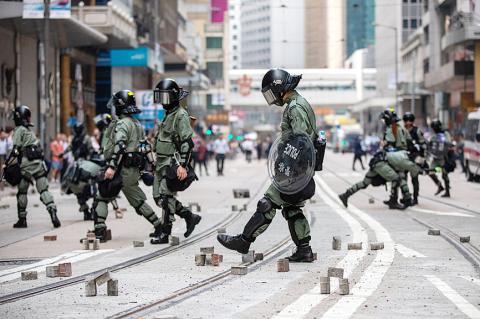Pro-democracy protesters challenging China’s rule of Hong Kong yesterday choked the territory with barricades and rallies for a fourth straight day, while police drafted in reinforcements and Chinese state media fueled speculation of a curfew.
The five-month crisis entered a new phase on Monday, when protesters embarked on a campaign to “blossom everywhere” across the territory in a bid to stretch police resources as thinly as possible.
Dressed in their signature black, masked protesters set up barricades on roads, vandalized train stations, rampaged through shopping malls and orchestrated rolling confrontations with riot police in multiple locations.

Photo: EPA-EFE
Another element of the protesters’ tactical shift was to disrupt the territory for consecutive days in a workweek, switching from their long-running strategy of primarily protesting on weekends or in evenings.
Yesterday, key arterial roads were again cut, many rail services were suspended, schools were closed, lunchtime rallies were held in the business district and protesters occupied universities.
With the protesters showing no signs of relenting, the nearly 30,000-strong police force announced it was drafting in 100 prison guards and looking for other reinforcements.
“The ongoing riots ... with their massive scale, simultaneous occurrence in various districts and grave severity of violence, make it necessary to strengthen the support for the police’s frontline officers,” a police spokesman said in a statement announcing that the prison guards would be called in.
No other reinforcement measures were announced, although Hong Kong Legislator Starry Lee (李慧瓊), of the territory’s biggest pro-Beijing party, urged the deployment of auxiliary officers.
The part-time volunteer force of civilians and ex-officers is usually used to direct traffic and control crowds at major outdoor sports or entertainment events.
In China, the Global Times reported that a Hong Kong curfew was possible.
The Global Times wrote online that the Hong Kong government was considering the implementation of a curfew at the weekend.
However, it later deleted the message.
“I just checked how the information was obtained ... the information is not sufficient to support this exclusive news,” Global Times editor Hu Xijin (胡錫進) said.

A Ministry of Foreign Affairs official yesterday said that a delegation that visited China for an APEC meeting did not receive any kind of treatment that downgraded Taiwan’s sovereignty. Department of International Organizations Director-General Jonathan Sun (孫儉元) said that he and a group of ministry officials visited Shenzhen, China, to attend the APEC Informal Senior Officials’ Meeting last month. The trip went “smoothly and safely” for all Taiwanese delegates, as the Chinese side arranged the trip in accordance with long-standing practices, Sun said at the ministry’s weekly briefing. The Taiwanese group did not encounter any political suppression, he said. Sun made the remarks when

PREPAREDNESS: Given the difficulty of importing ammunition during wartime, the Ministry of National Defense said it would prioritize ‘coproduction’ partnerships A newly formed unit of the Marine Corps tasked with land-based security operations has recently replaced its aging, domestically produced rifles with more advanced, US-made M4A1 rifles, a source said yesterday. The unnamed source familiar with the matter said the First Security Battalion of the Marine Corps’ Air Defense and Base Guard Group has replaced its older T65K2 rifles, which have been in service since the late 1980s, with the newly received M4A1s. The source did not say exactly when the upgrade took place or how many M4A1s were issued to the battalion. The confirmation came after Chinese-language media reported

The Taiwanese passport ranked 33rd in a global listing of passports by convenience this month, rising three places from last month’s ranking, but matching its position in January last year. The Henley Passport Index, an international ranking of passports by the number of designations its holder can travel to without a visa, showed that the Taiwan passport enables holders to travel to 139 countries and territories without a visa. Singapore’s passport was ranked the most powerful with visa-free access to 192 destinations out of 227, according to the index published on Tuesday by UK-based migration investment consultancy firm Henley and Partners. Japan’s and

BROAD AGREEMENT: The two are nearing a trade deal to reduce Taiwan’s tariff to 15% and a commitment for TSMC to build five more fabs, a ‘New York Times’ report said Taiwan and the US have reached a broad consensus on a trade deal, the Executive Yuan’s Office of Trade Negotiations said yesterday, after a report said that Washington is set to reduce Taiwan’s tariff rate to 15 percent. The New York Times on Monday reported that the two nations are nearing a trade deal to reduce Taiwan’s tariff rate to 15 percent and commit Taiwan Semiconductor Manufacturing Co (TSMC, 台積電) to building at least five more facilities in the US. “The agreement, which has been under negotiation for months, is being legally scrubbed and could be announced this month,” the paper said,